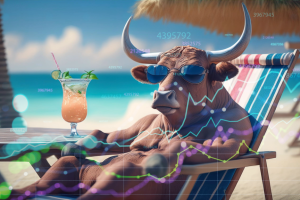Editor’s note: “Sneak a Peek Into the Powerful New AI Economy With ChatGPT” was previously published in February 2023. It has since been updated to include the most relevant information available.
Have you experimented with ChatGPT yet?
If you have, then you know that the conversational AI chatbot is absurdly impressive.
ChatGPT can answer any question about the history of the stock market or explain complex topics in simple terms. It can help with algebra homework, write advertisements, draft resumes, give relationship advice, write music, crack jokes – even pass the University of Minnesota Law School’s final exams.
But believe it or not, ChatGPT is just the tip of the iceberg when it comes to AI’s potential.
It’s smart by today’s standards. But it’ll be “dumb” compared to what comes next…
That is, thanks to two important factors, the AI programs we are playing with today – like ChatGPT – will become infinitely better and more abundant within just a few years.
Those two factors are data and cost.
Fueling AI’s Development
Let’s talk about the data first.
When we talk about AI, we’re using a catch-all term for machine learning (ML) and natural language processing (NLP) models that learn and improve over time.
And those models are informed entirely with data.
Basically, the more data they have, the more data they can learn from, the better the models get, and the more capable the AI becomes.
In the AI world, data is everything.
Think of it this way…
If AI is a car, then data is the fuel. The data powers the AI model, helping it get from point A (an instruction or a command) to point B (an action).
From this perspective, AI models are about to be injected with a whole bunch of fuel.
An Explosion of Data
Indeed, the global volume and granularity of data is exploding right now, mostly because every object in the world is becoming a data-producing device.
Over the past 20 years, we have seen a significant shift toward the “Smart World.” Devices have all begun to generate large amounts of data – phone usage data, in-car driving data, consumer preference data, fitness and activity data.
As we’ve sprinted into this “Smart World,” the amount and speed of data that AI algorithms have access to has exploded, making those AI algos more capable than ever…
For example, every minute, users send 575,000 tweets; share 240,000 photos on Facebook; stream 452,000 hours of Netflix (NFLX). Google conducts 5.7 million searches, and consumers spend $283,000 on Amazon (AMZN).
All of that data is gathered and analyzed by companies, who use it to train their AI algos and make them infinitely smarter.
Why else do you think AI has started popping up everywhere in recent years? It’s because the volume of data we’ve created and consumed increased by more than 50% over the past two years.
More data. Better ML and NLP models. Smarter AI.
It’s that simple.
ChatGPT: Approaching Smarter AI at Hyperspeed
And guess what? The world isn’t going to take any steps back in terms of this “smart” pivot. Instead, this transition will accelerate.
According to Statista, in 2020, the world produced about 47 zettabytes of data. But that number is expected to grow by more than 45X to 2,142 zettabytes of data by 2035.
Let’s go back to our process…
More data. Better ML and NLP models. Smarter AI.
Thus, as the volume of data produced soars more than 45X over the next few years, ML and NLP models will get 45X better (more or less), and AI machines will get 45X smarter (more or less).
Folks, ChatGPT may be impressive but it will be regarded as child’s play in the AI world within a few years.
Following the Cost-Decline Curve
But great AI is useless if it’s expensive AI.
AI will only profoundly change the world – and unlock $15 trillion of economic value over the next 10 years – if it is cheap enough to be deployed abundantly.
That brings us to a discussion of the second factor which will drive forward the AI Revolution of the 2020s: costs.
AI is built on top of computers, which benefit from both Moore’s Law – the number of transistors on a semiconductor chip will double every two years – and Wright’s Law – the cost of production decreases at a constant percentage for every cumulative doubling of production volume. Therefore, the computing costs for AI – which have been plunging for years – should continue to drop for the near future.
Not to mention, as data becomes more abundant in the coming years, the cost of data itself will drop, too. And so will the costs to gather, analyze, and store it.
Put it all together, and AI training costs should crash in the 2020s.
The cost to train a large language model to GPT-3 level performance was $4.6 million in 2020. Last year, it dropped to $450,000 – below even aggressive forecasts from ARK Invest for a drop to $740,000.
If this cost-decline curve persists, AI training costs could fall to $30 per model by 2030 – down 99.999% from 2020.
In other words, what we’re saying is that:
- AI models should get infinitely better over the next decade.
- AI models should get infinitely cheaper over the next decade.
The Final Word on ChatGPT
Those dots are easy to connect.
If AI gets infinitely better and cheaper over the next decade, it will become a ubiquity just like the internet – changing the world, unlocking a $15 trillion market, and giving rise to some generational wealth-creating opportunities on Wall Street.
In order to capitalize on those opportunities, you need to know where to look.
That’s why I host InvestorPlace’s first-ever AI Super Summit conference.
In that presentation, I discussed what AI is, how it works, what drives it, and why it’s only going to get better. I also shared how AI will change the world, what industries it will impact most over the next 12 months, and, of course, which AI stocks are the best to buy right now.
Trust me. If there is one presentation you don’t want to miss this year, this is it.
It could give you a sneak peek into the very future of our economy.
On the date of publication, Luke Lango did not have (either directly or indirectly) any positions in the securities mentioned in this article.






